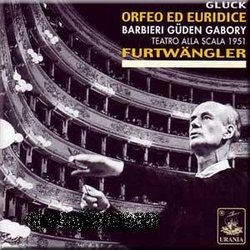| All Artists: Christoph Willibald Gluck, Fedora Barbieri, Hilde Gueden, Magda Gabory, Wilhelm Furtwangler (a/k/a Wilhelm Furtwaengler), Orchestra & Chorus of La Scala Theater Title: Orfeo ed Euridice (Barbieri, Gueden, Gabory/La Scala Orch. & Ch., Furtwangler) Members Wishing: 1 Total Copies: 0 Label: Urania Release Date: 1/29/2002 Genre: Classical Styles: Opera & Classical Vocal, Historical Periods, Classical (c.1770-1830), Modern, 20th, & 21st Century Number of Discs: 2 SwapaCD Credits: 2 UPCs: 675754471323, 8025726221968 |
Search - Christoph Willibald Gluck, Fedora Barbieri, Hilde Gueden :: Orfeo ed Euridice (Barbieri, Gueden, Gabory/La Scala Orch. & Ch., Furtwangler)
 | Christoph Willibald Gluck, Fedora Barbieri, Hilde Gueden Orfeo ed Euridice (Barbieri, Gueden, Gabory/La Scala Orch. & Ch., Furtwangler) Genre: Classical
|
Larger Image |
CD Details |
CD ReviewsJohn Ardoin Wrote in "The Furtwaengler Record" Record Collector | Mons, Belgium | 03/27/2006 (5 out of 5 stars) "Wilhelm Furtwaengler's return to this opera at La Scala in April 1951 marked his first re-creation of the score since his years in Mannheim almost four decades earlier. WF essentially uses the edition premiered in Paris in 1774, sung in Italian with some recitatives pruned & others modified to conform, perhaps, to performance practices peculiar to Italy. WF also cuts all but one of the seven pieces in the concluding ballet music. A lock of appoggiaturas is felt at phrase endings, yet in a few instances, such as in the aria "Che faro," they are unexpectedly found. One also notes this inconsistency in WF's performances of Mozart's operas.
There is enormous fascination to this Orfeo. WF's approach is of immense dignity yet plasticity. The sound of the Scala Orchestra is full & warm; the conductor draws playing of enormous transparency & expressiveness from his musicians. Throughout the music flows with ease. There are only moderate fluctuations of tempo. If there is a period feeling to the orchestral side of the performance, it is to be found in the restraint & beauty of line WF divined as the basis of the score. But with this classical chasteness comes a not incompatible romantic broadness. The Overture is played more allegro maestoso than Gluck's allegro molto; the opening chorus is one continual cresting & ebbing sigh of sadness. WF reminds us that Gluck was actually a transitional figure between the world of the rococo & of Beethoven. Barbieri's singing as Orfeo is vivid if veristic. " |

 Track Listings (12) - Disc #1
Track Listings (12) - Disc #1